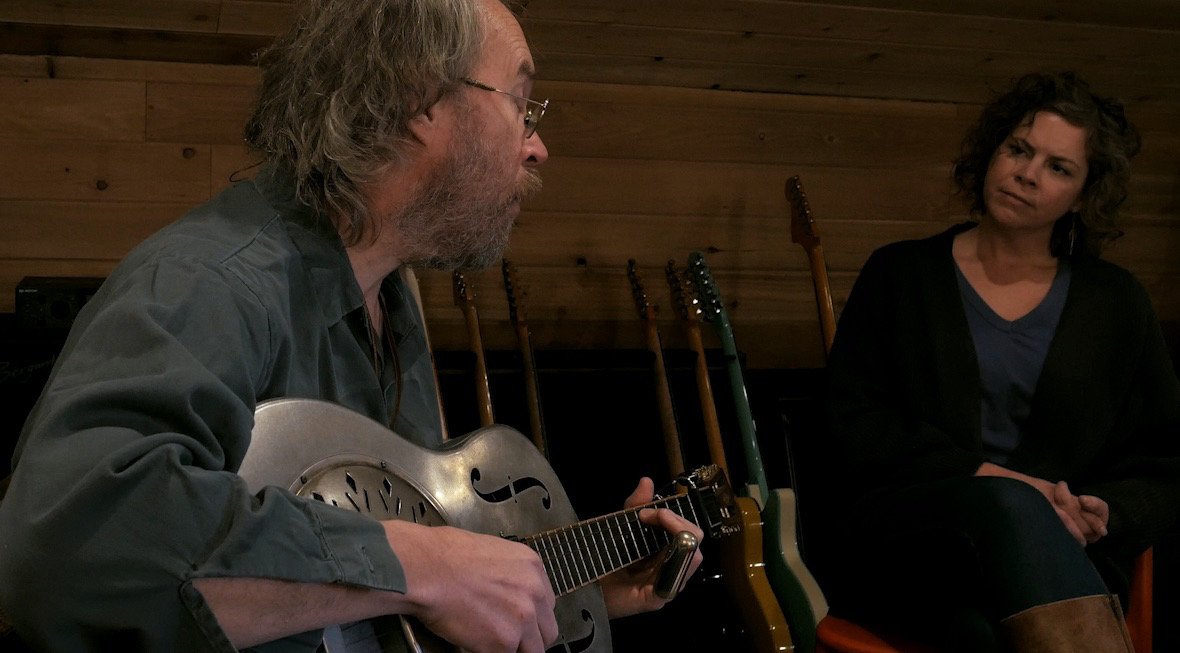New Video Series ‘Dissonance Sessions’ Explores Mental Health Through Music
Minnesota artists open up about mental health and how it shapes and is affected by their music in this powerful, revealing interview series.
“I don’t know what it looks like on the outside, but from the inside, you can’t talk to anybody.” Duluth folk artist Charlie Parr twists the edge of his blue button-down shirt absently in his fingers. “There’s this weird kind of curtain of fog all around you all the time. You can’t break through it. Nothing helps. Extreme discomfort all the time, like you’re wearing someone else’s clothes. … Things that normally make you feel better feel foreign and alien.”
In a wide-ranging conversation about songwriting, family history and mental health, it’s an intensely moving moment, hearing one of our local heroes describe how depression feels for him, and trying to reconcile that in my mind with what the life of a touring musician requires.
Parr’s the first guest on Dissonance Sessions, a new video series from the Minnesota nonprofit that aims to create “healthy community for creative people.” Dissonance has grown significantly in the 10 years since co-founder Sarah Souder Johnson first sat down with a group of college students to talk about the realities of making a living in the arts, especially how it relates to mental health and substance use. The organization’s been a standalone nonprofit for six years and offers everything from sober green rooms to a therapy resource directory to awareness-raising events.
Charlie Parr and Sarah Souder Johnson. Photo courtesy of Dissonance.
But at its core, Souder Johnson says, Dissonance has always been and still is about “hearing people's stories, and finding points of relation between people and between stories.” That’s why their new video project, first proposed by Minneapolis singer-songwriter (and series director) Jason Chaffee, was “a no-brainer.”
“It's really just getting at what we do really well, which is what we've always called concert conversations,” Souder Johnson (also the interviewer in the series) says. “This is a chance to really get more intimate, and go deeper into a couple songs for each artist as well as hear them in a much more stripped-down way.”
Chaffee adds, “As someone in recovery, I wanted a way to talk about the story behind music and about mental health. Especially in music, we're all very similar when it comes to our stories of recovery and mental health or even a lack of recovery or somebody struggling.” One of the challenges particular to artists, he points out, can be the prevalence of alcohol in the music scene: “For newer musicians starting out, sometimes you're not getting paid much money; they try and compensate you with drinks.”
Another is the need to be in public spaces and performing regardless of mental state, Souder Johnson says. “Something that didn’t make it into the first episode—we hope to share it in the future—was Charlie talking about his experience with social anxiety and what that's like as a touring musician; the isolation coupled with the constant need to be introducing yourself to new people as you go from venue to venue, having to pretend you're happy when you're not.
“He connects so well with his audience and he genuinely wants to be in the venues, but it's very challenging—how do you reconcile the thing you love and the way you share it with people when there seems to be an internal barrier?”
Charlie Parr and Sarah Souder Johnson. Photo courtesy of Dissonance.
These are the topics Dissonance hopes to make more open and destigmatize, Chaffee says. “Having Charlie Parr in episode one, it's not just going to bring in people who are familiar with Dissonance; it's going to bring in his fan base. Hopefully it spreads awareness of Dissonance, breaks the stigmas, and helps people have more conversations about mental health.”
“It’s particularly meant to support artists,” Souder Johnson adds. “To break stigmas and to challenge the glamorization of mental health struggles—that myth that you have to be really ‘crazy’ or unhinged to make great art. Actually, the opposite is true—people tap into their creativity in new ways when they're well. There’s something to be said for processing pain, and art as an outlet for healing.”
Souder Johnson and Chaffee are going for a run of five episodes of Dissonance Sessions this first season, with the second episode coming out this summer. Future guests include Minnesota artists Katy Vernon (also a Dissonance board member) and Chastity Brown. Meanwhile, you can check out Parr’s episode—which includes powerful live performances of two songs from his most recent album—and learn more about Dissonance.
Carol Roth is a full-time marketing copywriter and the main music journalist and social media publicist for Adventures in Americana. In addition to studying the guitar and songwriting, Carol’s additional creative side hustle is writing self-proclaimed “trashy” novels under the pseudonym T.A. Berkeley!



